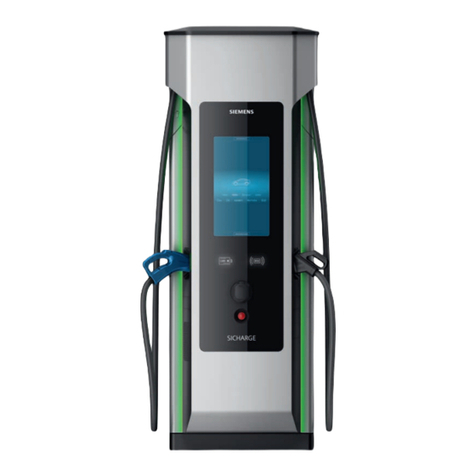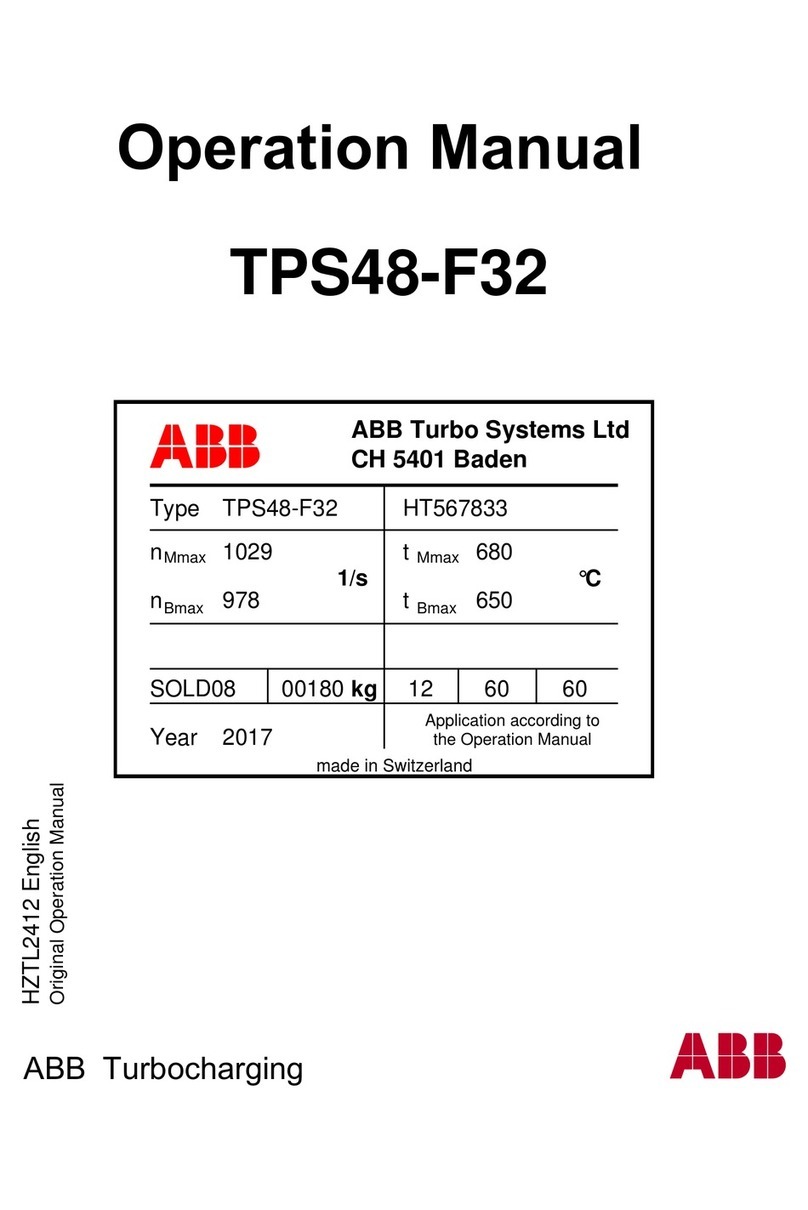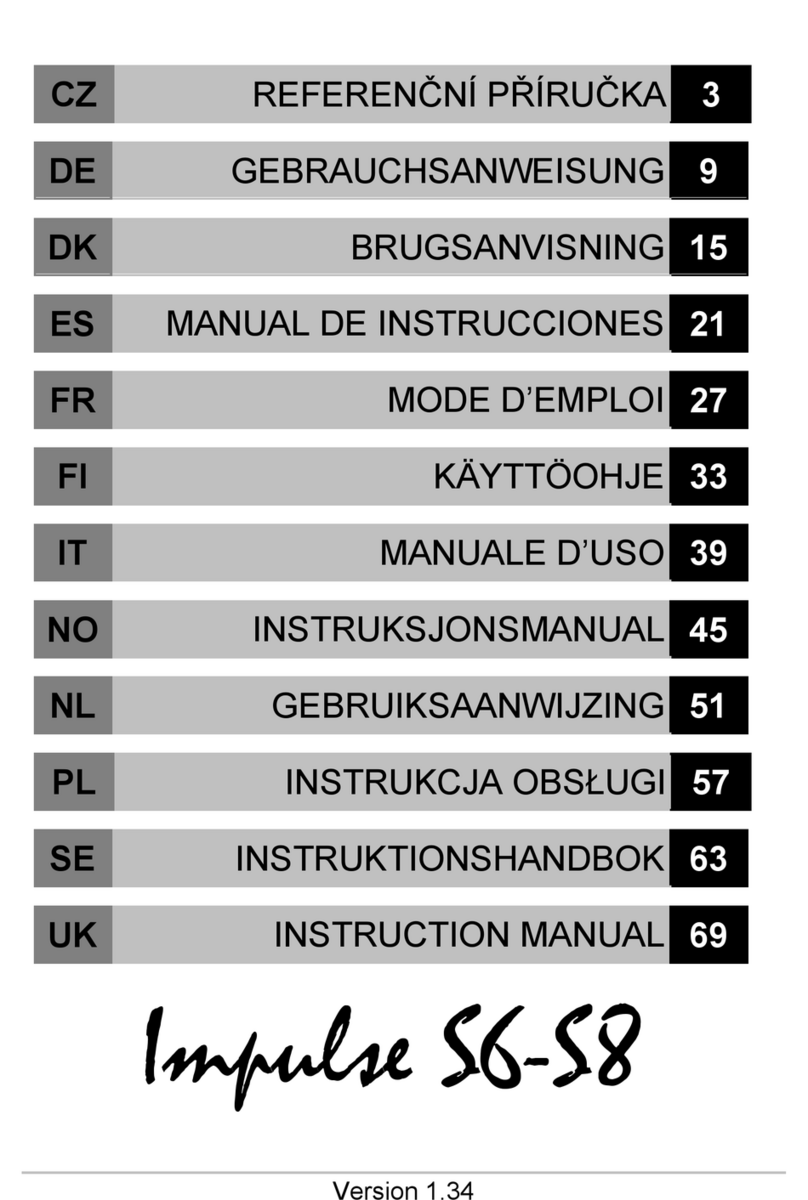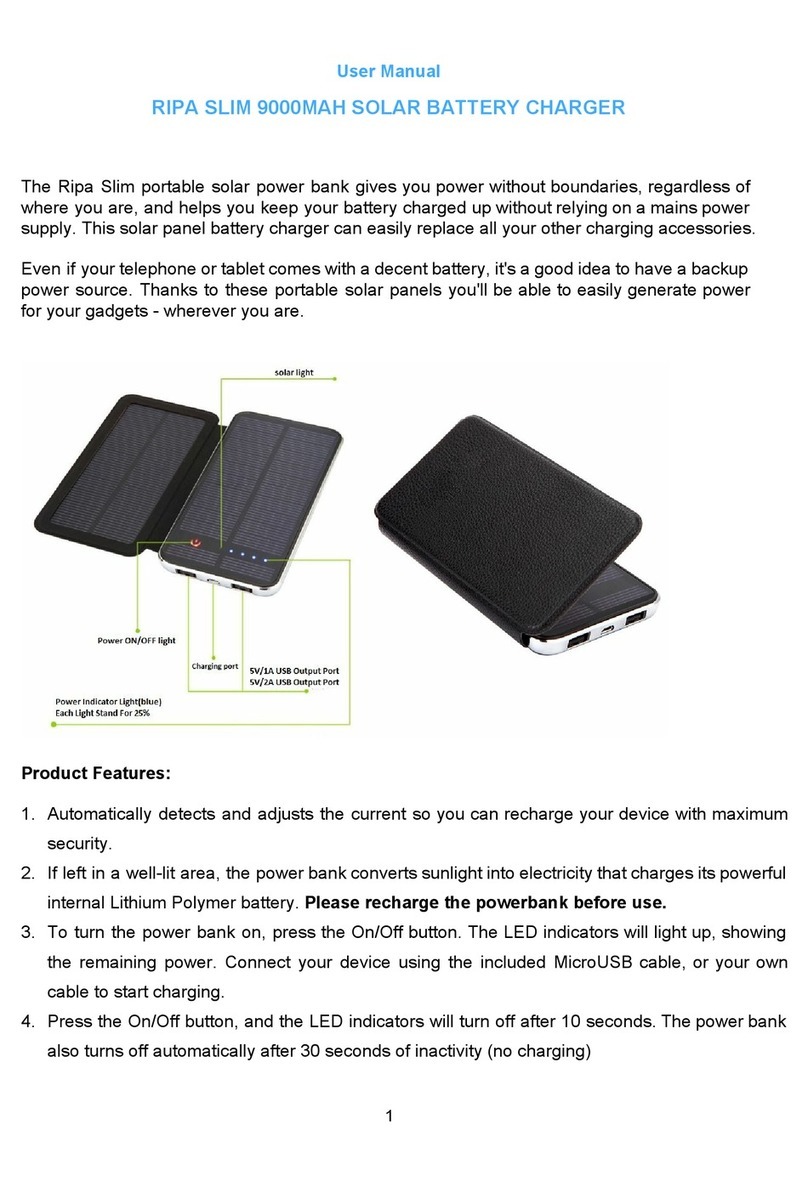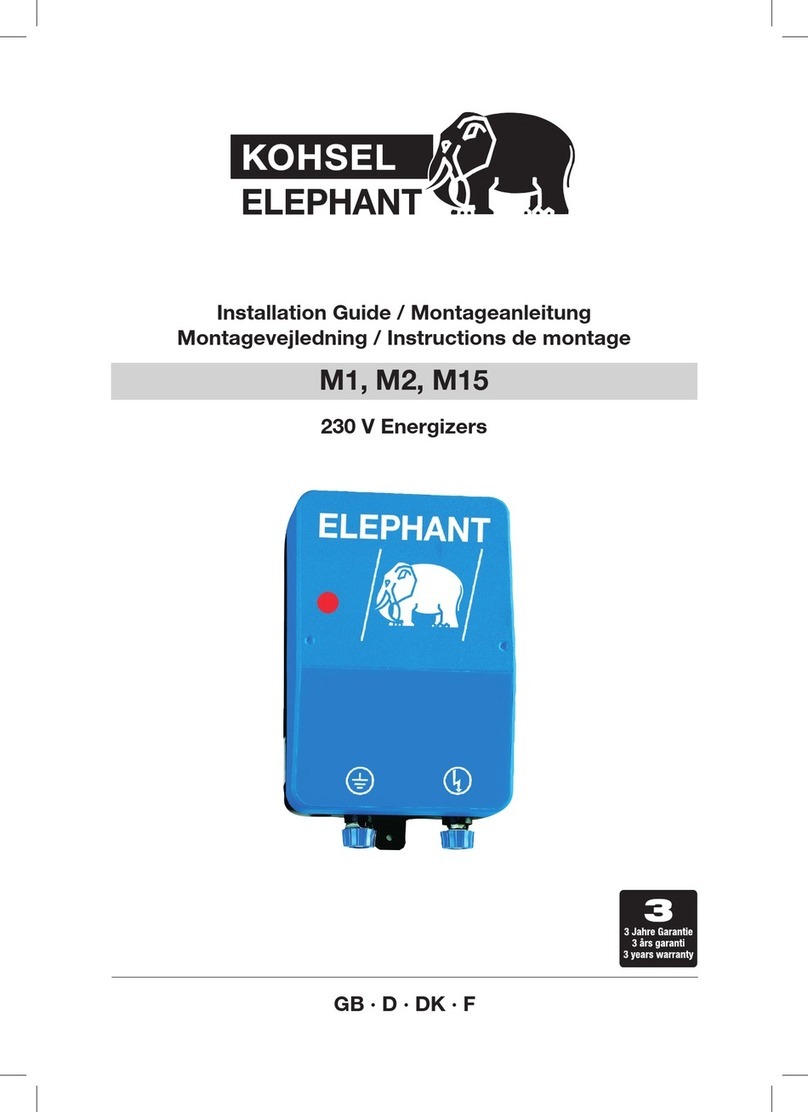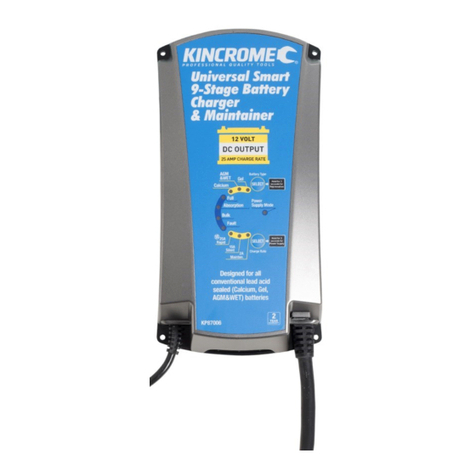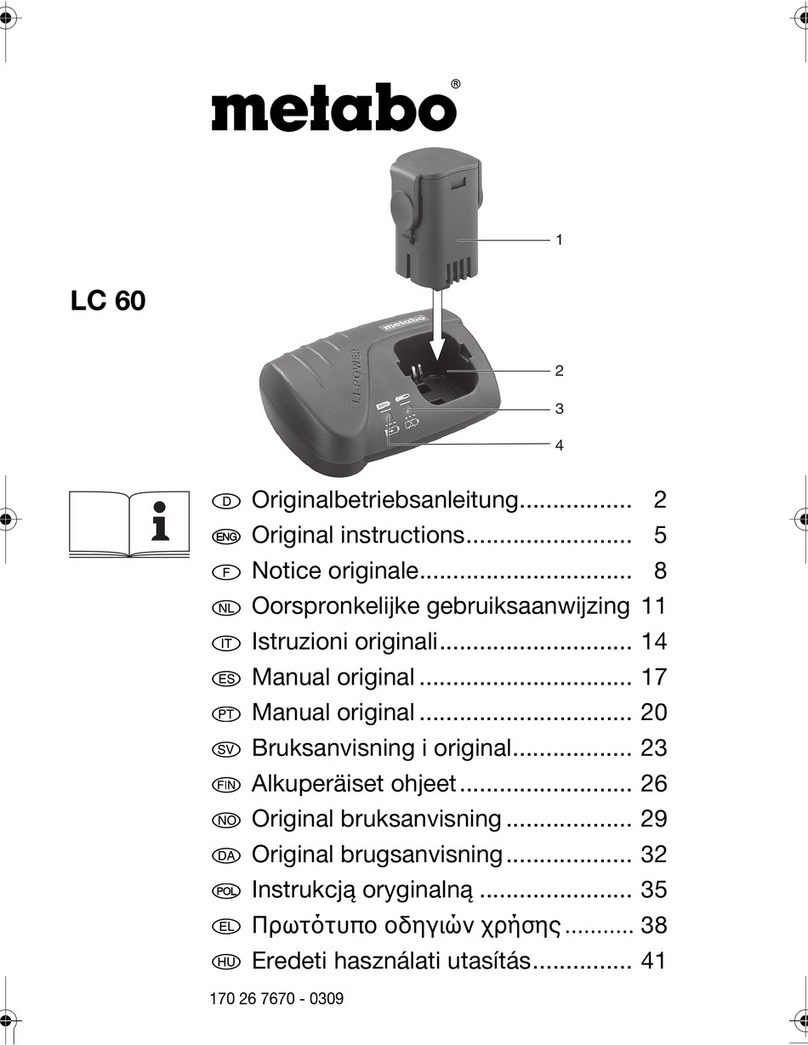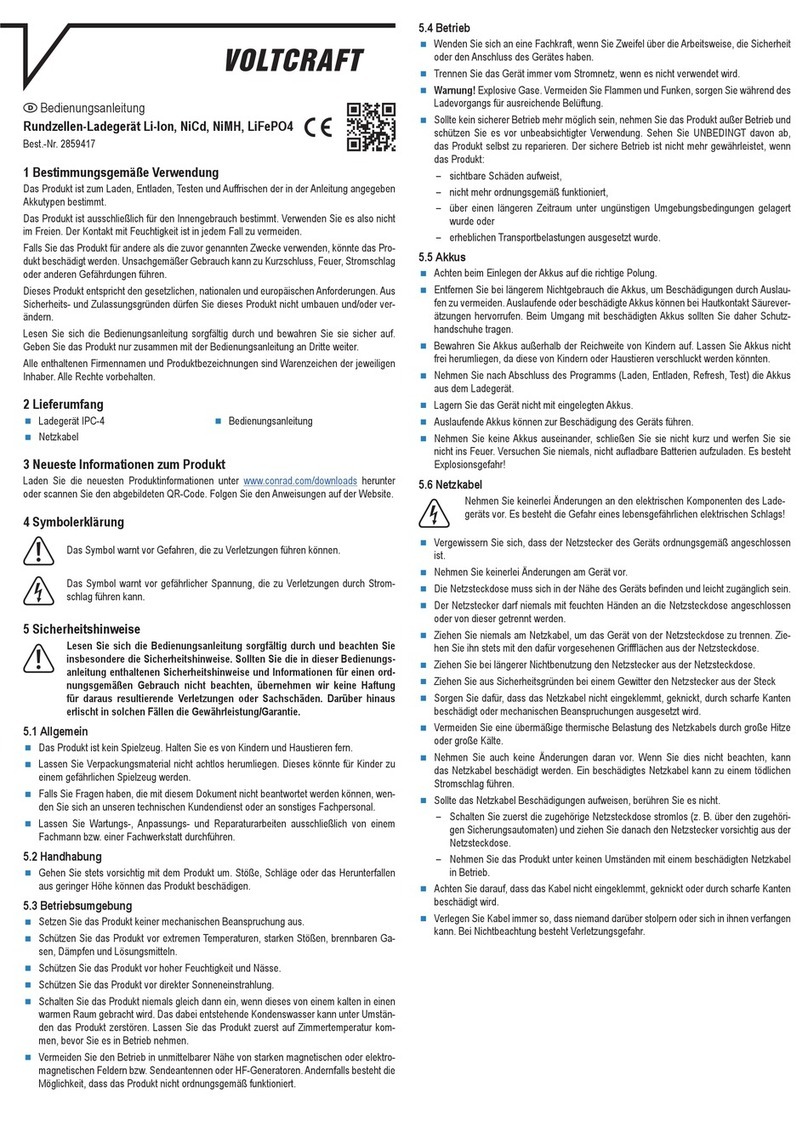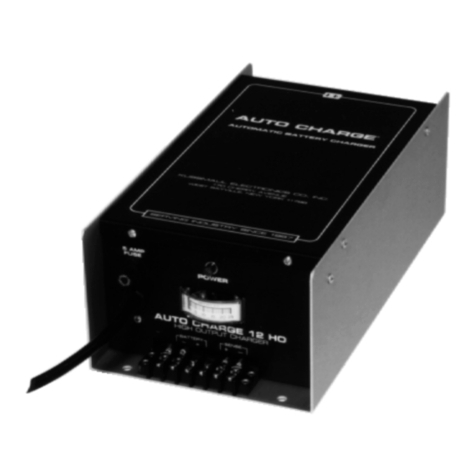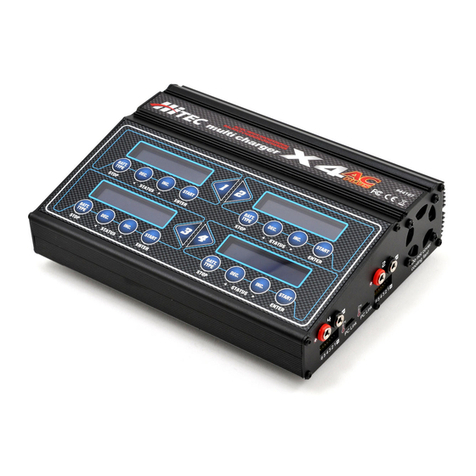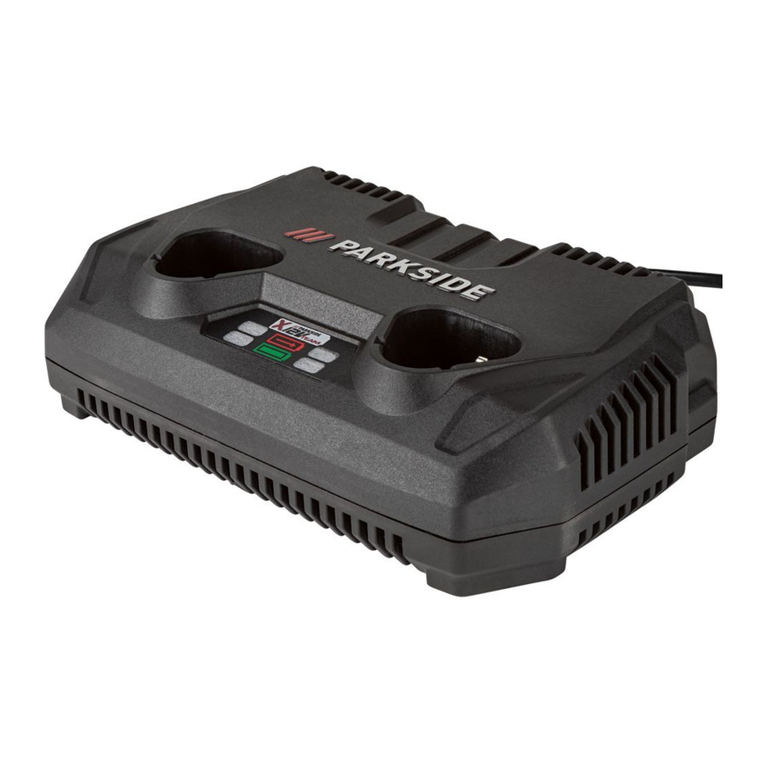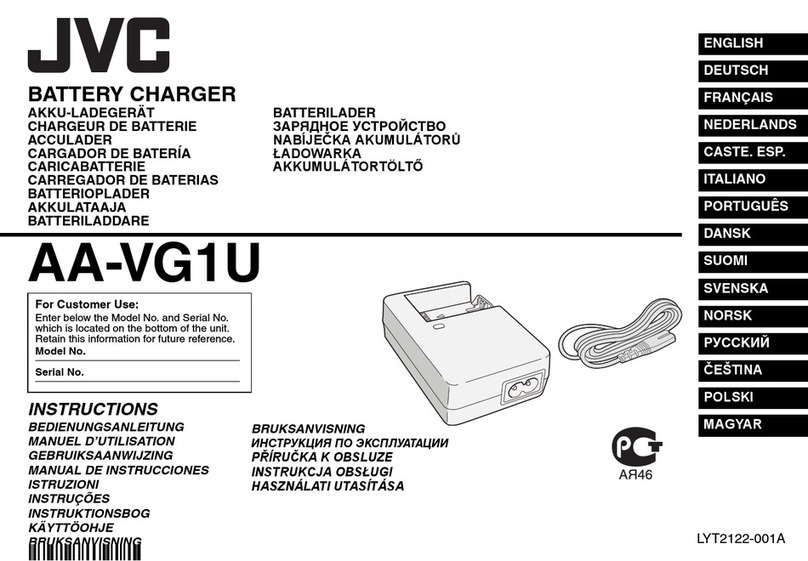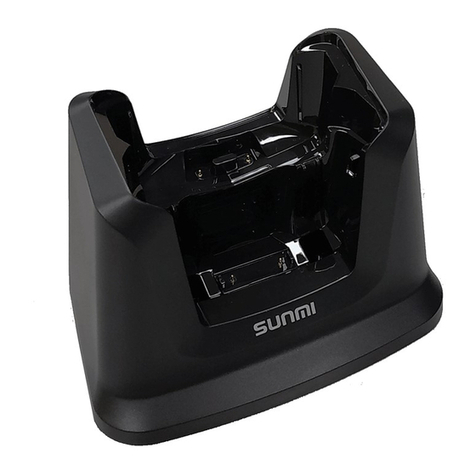Eltek Valere PSR327 User manual

RECTIFIER
PSR327
USER MANUAL
UM_PSR327_21TE_E_R5.0

Rectifier
PSR327
User Manual
Page 2 (20)
©2009. ELTEK VALERE DEUTSCHLAND GmbH. UM_PSR327_21TE_ E_R5.0
Notes to this manual
ATTENTION! Read this manual very carefully before installing and commissioning the specified module.
This manual is a part of the delivered module. Familiarity with the contents of this manual is required for
installing and operating the specified module.
The rules for prevention of accidents for the specific country and the general safety rules in accordance
with IEC 364 must be observed.
The function description in this manual corresponds to the date of publishing.
Technical changes and changes in form and content can be made at any time by the manufacturer
without notice. There are no obligations to update the manual continually.
The module is manufactured in accordance with applicable DIN and VDE standards such as VDE 0106
(part 100) and VDE 0100 (part 410). The CE marking on the module confirms compliance with EU
standards 2006-95-EG (low voltage) and 2004-108-EG (electromagnetic compatibility) if the installation
and operation instructions are followed.
Supplier:
ELTEK VALERE DEUTSCHLAND GmbH
GB Industrial
Schillerstraße 16
D-32052 Herford
+ 49 (0) 5221 1708-210
FAX + 49 (0) 5221 1708-222
Email Info.industrial@eltekvalere.com
Internet http://www.eltekvalere.com
2009. ELTEK VALERE DEUTSCHLAND GmbH. All rights reserved.

Rectifier
PSR327
User Manual
Page 3 (20)
©2009. ELTEK VALERE DEUTSCHLAND GmbH. UM_PSR327_21TE_ E_R5.0
The current revision status of this user manual is the following:
Revision: 5.0
Date: 2009-07-24
Revision Description of change Writer Date
00 First edition RTH 2007-11-06
01 Minor text modifications RTH 2008-01-04
02 Minor text modifications, sections “Commissioning”, “Output
power diagram” and “Monitoring” reworked RTH 2008-04-10
1.3 Minor text modifications, “Index of figures” inserted, new
revision status numbering (X.X) introduced. RTH 2008-11-03
2.0 Section 4.2.1 “Start-up behaviour” inserted; Technical
specifications: Adjustable output voltage range changed. RTH 2009-04-29
3.0 Section 4.5 “Monitoring” reworked. RTH 2009-05-15
4.0 Minor text modifications, section 4.7 “Default value setting
for NiCd batteries” inserted. RTH 2009-07-07
5.0 Technical specifications: “Internal decoupling circuit”
corrected. RTH 2009-07-24

Rectifier
PSR327
User Manual
Page 4 (20)
©2009. ELTEK VALERE DEUTSCHLAND GmbH. UM_PSR327_21TE_ E_R5.0
Table of Contents
1. Safety Instructions and Waste Disposal Rules ........................................................................5
2. General Information ........................................................................................................................6
3. Type Range/Equipment.................................................................................................................6
3.1 Main Data .....................................................................................................................................................................6
3.2 Available Options and Assembly Equipment.......................................................................................................7
3.3 Front view/Front side LED panel ............................................................................................................................8
3.4 Rear Side Connection ................................................................................................................................................9
3.5 Cooling and Air Flow Direction.............................................................................................................................. 10
3.6 Communication Interface...................................................................................................................................... 10
4. Handling .......................................................................................................................................... 11
4.1 Storage ...................................................................................................................................................................... 11
4.2 Commissioning......................................................................................................................................................... 11
4.2.1 Start-up behavior ............................................................................................................................................. 11
4.3 Charge Characteristic/Output Power Diagram ............................................................................................... 12
4.4 LED Indications......................................................................................................................................................... 13
4.5 Internal Monitoring.................................................................................................................................................. 13
4.6 Threshold & Default Values.................................................................................................................................. 14
4.7 Default value setting for NiCd batteries ........................................................................................................... 14
5. External Functions........................................................................................................................ 15
6. Maintenance .................................................................................................................................. 15
7. Troubleshooting............................................................................................................................ 16
8. Technical Specifications ............................................................................................................. 17
8.1 Dimensional Drawings............................................................................................................................................ 19
Index of Figures
Figure 1) DC Power Rack DCR PSR327-8.1 ....................................................................................................................7
Figure 2) DC Power Rack DCR PSR327-10.8..................................................................................................................7
Figure 3) Front view..............................................................................................................................................................8
Figure 4) Male connectors..................................................................................................................................................9
Figure 5) Module air flow.................................................................................................................................................. 10
Figure 6) Output power diagram (example PSR327/48-56)................................................................................... 12
Figure 7) Screenshot “Special software for CAN-Dongle”....................................................................................... 14
Figure 8) Module dimensions .......................................................................................................................................... 19

Rectifier
PSR327
User Manual
Page 5 (20)
UM_PSR327_21TE_ E_R5.0
1. Safety Instructions and Waste Disposal Rules
Warning!
Because several components of operating electrical modules are charged by dangerous voltage, the
improper handling of electrical modules may be the cause of accidents involving electrocution, injury, or
material damages.
Operation and maintenance of electrical modules must be performed by qualified skilled
personnel such as electricians in accordance with EN 50110-1 or IEC 60950.
Install the module only in areas with limited access to unskilled personnel.
Before starting work, the electrical module must be disconnected from mains. Make sure that
the module is earthed.
Do not touch connector pins as they can be charged with dangerous voltage up to 30 seconds
after disconnection.
Only spare parts approved by the manufacturer must be used.
All electric modules must be disposed of separate from domestic waste at collecting points that have
been set up by the government or municipal authority.
“Separate collection is the precondition to ensure specific treatment and recycling of WEEE and is
necessary to achieve the chosen level of protection of human health and the environment in the
Community.”
The above statement from EU directive 2002/96/EC applies to all electric modules installed within EU
countries.
In countries outside the EU, different rules may apply regarding waste disposal of electric modules.
For more information about waste disposal of your discarded equipment, contact your
ELTEK VALERE DEUTSCHLAND partner.
©2009. ELTEK VALERE DEUTSCHLAND GmbH.

Rectifier
PSR327
User Manual
Page 6 (20)
©2009. ELTEK VALERE DEUTSCHLAND GmbH. UM_PSR327_21TE_ E_R5.0
2. General Information
The PSR327 rectifier rectifies sinusoidal AC input voltage to DC output voltage.
The PSR327 is a hot plug-in module with rear side connectors and is designed to be mounted in an
assembly set 19’’ sub rack (see section 3.2). Due to the state-of-the-art circuitry design, the unit has
very low losses and therefore very compact dimensions, low weight and high power density.
The PSR327 rectifier can be used in all DC applications with or without battery.
The rectifier is delivered with factory set default values for lead acid batteries. If the rectifier is to be
used for NiCd batteries, the default values must be parameterized accordingly using a CAN dongle and
special software.
The nominal output power per unit is 2700 W. Up to a maximum of 48 modules can be switched in
parallel to increase the system output power or to build redundant power supply systems (n + 1-
principle).
3. Type Range/Equipment
Type Designation Material Code Nominal Output Voltage Nominal Output Current
PSR327/48-56 101-027-158.00 48VDC 56ADC
PSR327/60-45 101-027-168.00 60VDC 45ADC
PSR327/110-25 101-027-178.00 108VDC 25ADC
PSR327/220-12.5 101-027-188.00 216VDC 12.5ADC
3.1 Main Data
Nominal input voltage: 230VAC
Nominal input current: 12.9AAC
Input frequency: 47- 63Hz
Nominal output power 2700W
For more specific data, see section 8.

Rectifier
PSR327
User Manual
Page 7 (20)
©2009. ELTEK VALERE DEUTSCHLAND GmbH. UM_PSR327_21TE_ E_R5.0
3.2 Available Options and Assembly Equipment
Designation Material Code
DC Power Rack DCR PSR327-8.1 LV (assembly set 19’’ sub rack 3U
incl. backplane for three PSR327/48V or 60V rectifiers and one
UPC3-48/60V DC controller), DCC-CB1 connection board included.
102-327-318.LV01
DC Power Rack DCR PSR327-8.1 HV (assembly set 19’’ sub rack 3U
incl. backplane for three PSR327/110V or 220V rectifiers and one
UPC3-110V or 220V DC controller), DCC-CB1 connection board
included.
102-327-318.HV01
DC Power Rack DCR PSR327-10.8 LV (assembly set 19’’ sub rack 3U
incl. backplane for four PSR327/48V or 60V rectifiers). 102-327-408.LV01
DC Power Rack DCR PSR327-10.8 HV (assembly set 19’’ sub rack 3U
incl. backplane for four PSR327/110V or 220V rectifiers). 102-327-408.HV01
Cover plate (with handle) to cover empty PSR slots, 1/4 x 19’’, 3U;
RAL 7035 881-MEC-BPL.03.21.B
Monitoring, control and signalling unit (DC controller) UPC3-48/60V 301-003-598.02
Monitoring, control and signalling unit (DC controller) UPC3-110V 301-003-798.02
Monitoring, control and signalling unit (DC controller) UPC3-220V 301-003-898.02
DCC-CB1; connection board (with MSTB screw terminals) necessary
to connect all measuring, control and signalling wires over the
backplane of the sub rack to the control unit UPC3 (spare part).
302-DCC-CB1.00
CAN dongle, incl. software; necessary to change the internal default
values of the rectifier (e.g. for NiCd application). 880-CAN-DNG.00
Figure 1) DC Power Rack DCR PSR327-8.1 fully
equipped with three PSR327 rectifiers
and one UPC3 DC controller
Figure 2) DC Power Rack DCR PSR327-10.8 fully
equipped with four PSR327 rectifiers

Rectifier
PSR327
User Manual
Page 8 (20)
©2009. ELTEK VALERE DEUTSCHLAND GmbH. UM_PSR327_21TE_ E_R5.0
3.3
Front view/Front side LED panel
The PSR327 rectifier is equipped with the
following four LED indicators:
INPUT OK
OUTPUT OK
Vout>
ALARM
For more information about the LED indicators,
see section 4.4
Two captive screws are used for each module to
secure it to the sub rack (components of the
module)
Figure 3) Front view

Rectifier
PSR327
User Manual
Page 9 (20)
©2009. ELTEK VALERE DEUTSCHLAND GmbH. UM_PSR327_21TE_ E_R5.0
3.4 Rear Side Connection
The rear side male connections (AC input voltage, DC output voltage and signals) are shown in figure 4)
and are defined in the table below.
Figure 4) Male connectors (shown from the rear side of the module)
Pin assignment of the rear side connector:
Pin Function
2b L1 - Input
5b N - Input
8b - - -
11b PE
13a CAN - CVSS
13c (-) output voltage sense link
14a CAN - H
14c CAN - L
15a - - -
15c CAN - CVCC
16a AGND
16c - - -
17a Hardwarecoding CODE2
17c Hardwarecoding CODE1
18a Collective Alarm NC
18c Collective Alarm COM
19a Collective Alarm NO
19c - - -
20a - - -
20c (+) output voltage sense link
22b (-) Output
25b (-) Output
28b (+) Output
31b (+) Output

Rectifier
PSR327
User Manual
Page 10 (20)
©2009. ELTEK VALERE DEUTSCHLAND GmbH. UM_PSR327_21TE_ E_R5.0
3.5 Cooling and Air Flow Direction
The unit is cooled with an internal fan. The airflow is from the front to rear side. The fan is monitored and
speed-controlled dependent on module temperature. To provide sufficient air flow, a minimum space
(see item “A” in figure 5) of 50 mm is required between the unit and the rear cabinet wall as well as an
unobstructed supply of air to the front of the module.
Figure 5) Module air flow
3.6 Communication Interface
The PSR327 rectifier is equipped with a serial data interface in accordance with the Controller Area
Network (CAN) specification. The CAN-Bus connection is integrated in the rear side connector.
Several modules in a system or parallel connection can be controlled and monitored through the CAN-
Bus by a central UPC3 DC controller unit.
The following parameters of a specific rectifier unit can be controlled or monitored:
Output voltage
Output current
Device temperature
Device status
Furthermore, the rectifier unit receives all threshold values through the CAN-Bus from the
DC controller unit.

Rectifier
PSR327
User Manual
Page 11 (20)
©2009. ELTEK VALERE DEUTSCHLAND GmbH. UM_PSR327_21TE_ E_R5.0
4. Handling
4.1 Storage
Modules must be stored in a dry, dust free environment with a storage temperature in accordance with
the specific technical data (see section 8).
4.2 Commissioning
Note: Before commissioning the module, make sure that the input voltage corresponds to the input
voltage range of the unit as specified on the type plate and that the output voltage of paralleled units
matches.
1. Carefully unpack the unit
2. Fill the rack beginning with the left slot.
3. Put the unit into an empty slot.
4. Carefully slide in the unit until the module connector touched the backplane connector.
5. Increase the force until the unit fits in completely. Avoid using too much force. If the unit does not
fit in, begin again at step 3.
6. Secure the module using the two captive screws (M3x12) provided with the module.
7. Switch ON the module by external MCB.
Note: The PSR327 is serially equipped with an internal output side decoupling diode. This ensures
hot plug-in capability for the module and enables the operator to add modules under operating
conditions.
Note: Before a module is to be removed, it must be switched off by the external input fuse!
Caution: After switching off the module the internal capacitors are still fully charged. Do not touch
connector pins as they can still be charged with dangerous voltage after disconnection.
4.2.1 Start-up behavior
When the PSR327 is switched on (without CAN-Bus connection) first it provides a start-up voltage
according to the table below. The start-up voltage is held for 60 seconds, than the output voltage steps
up to the internal default value.
PSR327 48V version 60V version 110V version 220V version
Start-up voltage (VDC) 45.0 55.5 97.5 192.0
Default value Vo (VDC) 54.5 68.1 122.6 245.2
If a DC controller unit (UPC3) is integrated into the system, it is powered with the start-up voltage after
the rectifier has been switched on. The output voltage immediately steps up to the value given from the
UPC3 unit via CAN-Bus.
If a DC controller unit (UPC3) is integrated into the system (e.g. powered by the battery and due to this
operating yet) the rectifier directly provides the output voltage given from the UPC3 unit via CAN-Bus.

Rectifier
PSR327
User Manual
Page 12 (20)
©2009. ELTEK VALERE DEUTSCHLAND GmbH. UM_PSR327_21TE_ E_R5.0
4.3 Charge Characteristic/Output Power Diagram
The charge characteristic of the PSR327 is a power limited IV characteristic curve in accordance with
DIN 41772/DIN 41773.
For modules in parallel operation mode a load sharing of about ±10% is attained due to a sloping output
voltage line (-1% at 100% Inom).
The module is continuously short circuit proof.
Figure 6) Output power diagram (example PSR327/48-56)
Calculation of the output current (Io) at different output voltage values using the PSR327/48-65 being
the example:
The PSR327 rectifier provides an output power of Vonom x Ionom= Ponom (48V x 56.25A= 2700W).
As shown with the output power diagram (see figure 6), the nominal output current (56.25A) is available
at the nominal output voltage (48.0V).
At other output voltage values (e.g. float or boost charge voltage), the output current is corresponding
to the following formula: Io= Ponom : Vo
Example 1):
Float charge voltage for lead acid batteries (24 cells) = 54.5V; Io= 2700W : 54.5V= 49.5A
Example 2):
Boost charge voltage for lead acid batteries (24 cells) = 57.6V; Io= 2700W : 57.6V= 46.9A

Rectifier
PSR327
User Manual
Page 13 (20)
©2009. ELTEK VALERE DEUTSCHLAND GmbH. UM_PSR327_21TE_ E_R5.0
4.4 LED Indications
Functions of front panel LED indicators
LED Colour Function
green INPUT OK - Mains input voltage okay
(criteria: 195VAC ≤Vn ≤265VAC)
green OUTPUT OK - Vout ok (criteria: Vout ≥97% of adjusted value)*
red Vout > (criteria: Vout ≥ than adjusted operating threshold)*
red ALARM - Collective alarm**: Vin incorrect, Vout incorrect, module
overtemperature, fan failure and short circuit
*For factory set output voltage threshold values, see section 4.6
**The module is equipped with an isolated signalling contact (normally open contact).
The maximum load is 60VDC/500mA. The contact is time-delayed and reacts after approx. 10 sec.
4.5 Internal Monitoring
Monitored values Criteria Function
I.) Mains input voltage 164V≤ Vn≤ 195V Linearly decreases output power.
II.) Mains input voltage <164V Module automatically switches off.
III.) Mains input voltage >184V Module switches on.
AC input voltage
IV.) Mains input voltage >275V Module switches off (self-locking). It
must be manually restarted.
DC output voltage Output voltage higher than the
adjusted operating threshold*
Module automatically switches off (self
locking). The unit must be manually
restarted.
Module
temperature Heat sink temperature ≥80°C
Module automatically switches off. It
automatically switches on when the
heat sink cools down to ≤70°C.
Cooling fan Cooling fan malfunction
Module automatically switches off.
After 30 sec. the module automatically
tries three times to restart. If this fails,
the module switches off and must be
manually restarted.
Short circuit
Module automatically detects short
circuit operation by the output voltage
value. (criteria: Vout ≤83% of Vnom)
Module automatically switches off after
3 seconds. After 30 seconds the
module automatically tries to restart
repeatedly.
*For factory set output voltage threshold values, see section 4.6

Rectifier
PSR327
User Manual
Page 14 (20)
©2009. ELTEK VALERE DEUTSCHLAND GmbH. UM_PSR327_21TE_ E_R5.0
4.6 Threshold & Default Values
The following table shows the factory set threshold/default values internally stored in the PSR327 unit
(for lead acid batteries):
Default values 48V version 60V version 110V version 220V version
Output voltage Vo (VDC) 54.5 68.1 122.6 245.2
Over voltage V> (VDC) 60.0 75.0 135.0 270.0
Current limiting Iconst (ADC) 56.0 45.0 25.0 12.5
Note: The threshold/default values can only be changed in combination with a UPC3 DC controller unit.
If an UPC3 DC controller unit is controlling the power supply unit through the CAN-Bus, the charge
voltage is completely controlled by the UPC3 based on its configuration values and momentary charge
state (for example temperature compensation, boost charge, or battery test). That means that the
values sent from the UPC over CAN-Bus have top priority. During CAN-Bus communication the internally
stored values of the rectifier are invalid.
But when the CAN-Bus connection is inactive for more than five seconds (e. g. due to trouble), the
PSR327 automatically switches back to the internally stored default values. In this case it is ensured
that the battery is charged in the float charge mode.
4.7 Default value setting for NiCd batteries
If the rectifier is to be used to charge NiCd batteries the default/threshold values must be set according
to the individual battery type using a CAN dongle and special software (see section 3.2 “Available
Options and Assembly Equipment”). A specific manual is available on request. For the adjusting range of
the output voltage please see section 8 “Technical Specifications”.
Figure 7) Screenshot “Special software for CAN-Dongle”

Rectifier
PSR327
User Manual
Page 15 (20)
©2009. ELTEK VALERE DEUTSCHLAND GmbH. UM_PSR327_21TE_ E_R5.0
5. External Functions
If the rectifier works together with a UPC3 DC controller unit, the following external functions can be
used:
Compensation of output voltage
Temperature compensation of charge voltage
Discharge test
Boost charge mode
For more information about these functions, read the UPC3 user manual.
6. Maintenance
In general, the rectifier is maintenance-free. Exclusively the fan is a component consisting of moving
parts. By way of precaution a yearly inspection with following checks is recommended:
Mechanical/visual inspection
Removal of dust and dirt, especially on radiator surfaces
Check for internal dust or humidity
It is recommended to exchange the fan every five years.
Attention! Dust combined with moisture or water may influence or destroy the internal electronic
circuits.
Dust inside the unit can be blown out with dry compressed air.
The interval between the checks depends on ambient conditions of the installed module.

Rectifier
PSR327
User Manual
Page 16 (20)
©2009. ELTEK VALERE DEUTSCHLAND GmbH. UM_PSR327_21TE_ E_R5.0
7. Troubleshooting
Symptom Possible reason Corrective action
Is mains voltage present?
Check
Mains switched to “ON” position? Check
PSR327 module plugged in securely?
Check
Incorrect polarity or short circuit at the output?
Check
No output
voltage
LED V> on? 1.) Switch the module off and on.
2.) Check the settings for
V> (see section 4.6).
Is the unit operating in current limiting mode
due to overload?
Reduce the load
Is the output voltage setting Vout at the DC
controller incorrect?
Adjust output voltage to nominal
values (see section 4.6)
Deviation of the
output voltage
If an external sensor lead is used for the output
voltage, is the connection faultless?
Check
If the module still does not work even though all checks have been done, contact your sales agent or the
ELTEK VALERE DEUTSCHLAND service department.

Rectifier
PSR327
User Manual
Page 17 (20)
©2009. ELTEK VALERE DEUTSCHLAND GmbH. UM_PSR327_21TE_ E_R5.0
8. Technical Specifications
Type designation PSR327/48-56 PSR327/60-45 PSR327/110-25 PSR327/220-12.5
Material code 101-027-158.00 101-027-168.00 101-027-178.00 101-027-188.00
AC input:
Nominal input voltage 230VAC ±20%
Nominal input current 12.9AAC
Input frequency range 47- 63Hz
Power factor >0.99 @ P >50%
Total harmonic distortion <5%
Efficiency ≥91%
Internal input fusing 16A (6.3 x 32mm)
DC output:
Nominal output voltage 48VDC 60VDC 108VDC 216VDC
Nominal output current 56ADC (@ 48V) 45ADC (@ 60V) 25ADC (@ 108V) 12.5ADC (@216V)
Nominal output power 2700W
Charge characteristic line IV characteristic according to DIN41772/DIN41773; power limited
Adjustable output voltage
range
42 – 62VDC 52.5 – 78VDC
87 – 150VDC
170– 295VDC
Default value of the charging
voltage (factory set,
2.27V/cell; lead acid battery*)
54.5VDC 68.1VDC
122.6VDC
245.2VDC
Output over voltage Vo>
(factory set, 2.5V/cell; lead
acid battery*)
60VDC 75VDC 135VDC 270VDC
Output under voltage Vo<
(factory set, 1.7V/cell; lead
acid battery*)
40.8VDC 51VDC 91.8VDC 183.6VDC
*Default/threshold values for charging of NiCd batteries are settable using a CAN dongle and special software.
Voltage ripple / psophometric
acc. to CCITT-A
≤20mVpp/
≤ 1.8mV
≤20mVpp/
≤2.0mV
≤100mVpp/
n/a
≤200mVpp/
n/a
Dynamic accuracy of the
charge voltage
<3% Vnom at load changes between 10%-90%-10% Inom;
transient time ≤1.5ms
Short circuit protection Continuously short circuit proof; 1 x Inom

Rectifier
PSR327
User Manual
Page 18 (20)
©2009. ELTEK VALERE DEUTSCHLAND GmbH. UM_PSR327_21TE_ E_R5.0
Type designation PSR327/48-56 PSR327/60-45 PSR327/110-25 PSR327/220-12.5
Parallel operation Yes (max. 48 units with UPC3 DC controller unit);
current sharing ≤10% Inom; sloping output voltage line (-1% at 100% Inom)
Internal decoupling at the
output
Yes; active, low-
loss decoupling
circuit in the
negative output
line
Yes, in the
positive output
line
Internal output fuse 80A 80A 30A 20A
Standard Features:
LED signalling Input OK (green), Vo OK (green), Vo> (red), Alarm (red)
Main processor 16Bit Fujitsu
Isolated signalling contact “Collective alarm”; relay COM/NO/NC, maximum contact load: 60VDC/500mA
Communications interface CAN-Bus, proprietary protocol
Environmental:
Ambient temperature Operation: -20°C to +55°C, storage: -40°C to +85°C
Climatic conditions according to IEC 721-3-3 class 3K3/3Z1/3B1/3C2/3S2/3M2
Max. installation altitude ≤ 1500m
Audible noise <45dB (A)
Mechanical:
Type of construction ¼ x 19’’, 3U
Cooling Fan cooling (temperature-controlled, r.p.m.-monitored)
Connector AC input, DC output and signals: DIN41612-M-connector
Dimensions (W/H/D) 106.3/133/326.5mm
Minimum installation depth 438 mm (in combination with an assembly set 19’’ sub rack)
Weight approx. 3.9kg
Type of enclosure / Protection
class
IP20 (front panel) / 1
Colour Front panel: RAL 7035, neutral, black print RAL 9005
Compliances:
CE conformity yes
Compliance to safety
standards
EN60950-1; VDE0100 T410; VDE0110; EN50178; EN60146
Compliance to EMC standards EN55022/24 (ITE), class “A“; EN61000-4 T2-5

Rectifier
PSR327
User Manual
Page 19 (20)
©2009. ELTEK VALERE DEUTSCHLAND GmbH. UM_PSR327_21TE_ E_R5.0
8.1 Dimensional Drawings
Figure 8) Module dimensions

Supplier:
ELTEK VALERE DEUTSCHLAND GmbH
GB Industrial
Schillerstraße 16
D-32052 Herford
+ 49 (0) 5221 1708-210
FAX + 49 (0) 5221 1708-222
Email Info.industrial@eltekvalere.com
Internet http://www.eltekvalere.com
2009. ELTEK VALERE DEUTSCHLAND GmbH. All rights reserved.
This manual suits for next models
8
Table of contents
